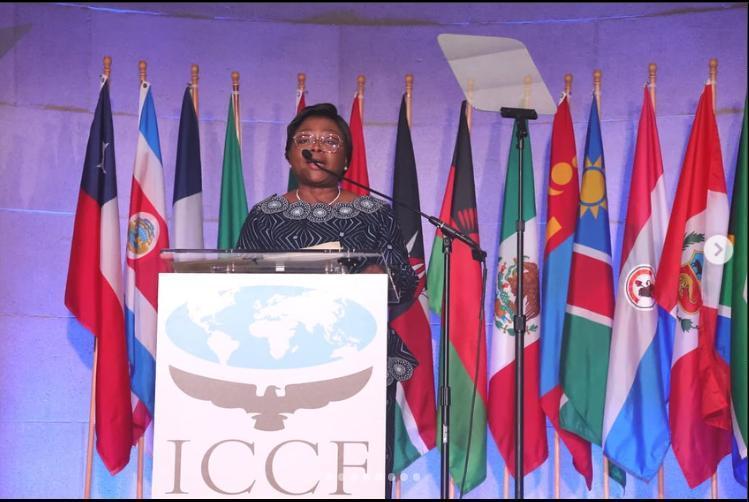Africa-Press – Angola. Angola ́s Vice President Esperança da Cost, on Tuesday in Washington D.C., United States of America (USA), reaffirmed the country’s commitment to empowering young people through science, technology and innovation as essential tools for sustainable development.
In her speech at the annual gala of the International Conservation Caucus Foundation (ICCF), she spoke about strengthening technical and scientific skills as a priority for the government, emphasizing that Angolan youth should be the protagonists in transforming the country’s natural wealth into an engine of economic and environmental progress.
Esperança da Costa stated that, within the framework of the “pro tempore” Presidency of the African Union (AU), the Angolan Head of State, João Lourenço, reaffirmed Angola’s commitment to the implementation of the African Agenda 2023-2030 for Biodiversity, aligned with the Sustainable Development Goals (SDGs).
She also highlighted Angola’s support for the “Africa Keystone Protected Area Partnership,” an African conservation initiative that, in her view, can become a real engine for African solutions to global environmental challenges.
During the ceremony, a Vice-President offered greetings on behalf of President João Lourenço and expressed gratitude to the ICCF for the invitation and the remarkable work being done in preserving ecosystems and global biodiversity.
Natural wealth and environmental conservation
During her speech, Esperança da Costa highlighted Angola’s ecological diversity, encompassing biomes such as the Maiombe rainforest, the Miombo forests, and savannas, in addition to 1,650 kilometers of coastline with abundant fisheries resources and coastal mangrove areas.
She mentioned that the country is part of important river basins originating in the central plateau, namely the Zambezi, Cuanza, Congo and Okavango rivers, the latter considered a vital freshwater reservoir for the African continent.
According to the Vice-President, Angola’s natural heritage represents a set of opportunities for sustainable development and it is essential to reconcile environmental protection with inclusive economic growth.
In a meeting with the participation of several world figures, she recalled that the joint efforts of the government and international partners have enabled the recovery of 14 conservation areas, as well as creation of three new national parks, increasing the proportion of protected areas from 6.6% to 13% of the national territory.
Esperança da Costa emphasized that Angola is focused on creating new marine products and terrestrial protected areas, based on safe paradigms defined in the United Nations Educational, Scientific and Cultural Organization (UNESCO) program named “Man and the Biosphere”, which has already allowed the classification of the first reserve, the Quiçama Biosphere Reserve.
Strategic Partnerships
The Vice-President thanked the US government for its support in strengthening bilateral partnerships, highlighting the Lobito Corridor, a strategic logistics infrastructure linking the Port of Lobito to the interior of the continent, connecting Angola, Zambia and the Democratic Republic of Congo (DRC) to markets.
On the other hand, she emphasized that this year Angola celebrates the 50th anniversary of its Independence, to be marked on November 11th, an occasion on which the country reinforces its commitment to the conservation of biodiversity as the basis of common biodiversity.
The Vice-President also invited international partners and North American investors to invest in Angola’s sustainable development, highlighting that the country offers a favorable environment for cooperation and green investment.
To conclude, she stressed that the strategic partnership with the ICCF constitutes an important boost for Iona National Park, allowing for a balance between the rational exploitation of natural resources and global environmental concerns, in order to guarantee stability, peace and the well-being of future generations.
The ICCF’s annual gala aims to conserve biodiversity and protect unique ecosystems, such as the Amazon rainforest and the Congo Basin, as well as combat species extinction. It also aims to combat climate change, as well as to protect forests that store large amounts of carbon and double the area of oceans under protection.
For More News And Analysis About Angola Follow Africa-Press






